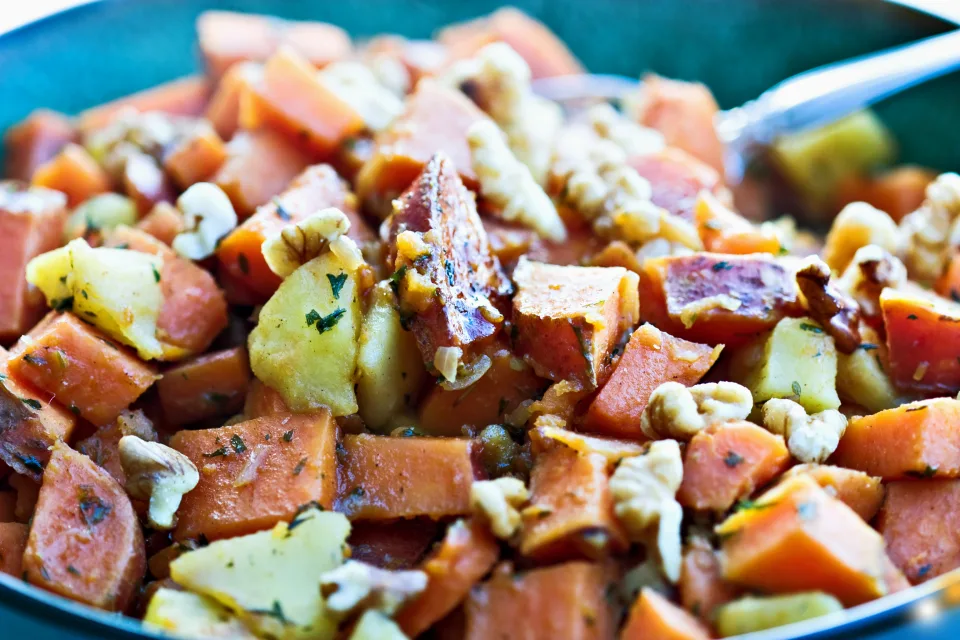 Most of our breakfasts come in one of two forms: a carb overload or nothing at all, save for a cup of coffee.
Most of our breakfasts come in one of two forms: a carb overload or nothing at all, save for a cup of coffee.
Unfortunately, neither is a particularly healthy option. Traditional American breakfasts involve high-fat and high-carb foods, while skipping breakfast completely may lead you to make poor food choices for the rest of the day, especially if you grab unhealthy snacks when you’re hungry.
This coming year, however, we invite you to break your routine and consider an all-important third option: vegetables for breakfast! Swapping toast or potatoes for vegetables not only prevents you from loading up on empty calories, but provides you with a wealth of health benefits.
The Science Behind Vegetables for Breakfast If you’re struggling to reach your daily intake of vegetables, you’re not alone. According to the CDC, only 1 of every 10 adults consumes enough fruits and vegetables. Eating veggies for breakfast can make it easier to reach the recommended two to three cups. And if you fill up on plant foods, you will leave less room for high-calorie snacks.
Better yet, studies have shown that your mood may improve after eating a low-fat, complex carb breakfast. Munching on fruits, vegetables, and complex carbohydrates instead of simple starches and fatty foods can even benefit your mental performance by improving memory function, attention, and how you process information.
Another study shows that eating more leafy greens can slow cognitive decline in middle-aged and older adults. Leafy greens are rich vitamins and nutrients that may improve brain health, including:
Vitamin K (phylloquinone), which has anti-inflammatory effects and may be essential in protecting brain function.
Lutein, which works as an antioxidant and anti-inflammatory agent.
Beta-carotene, an antioxidant which may reduce the risk of Alzheimer’s and improve memory performance.
Nitrate, which may improve blood flow to the brain.
Folate, which may protect against depression and dementia in older adults (though research on the benefits of folate is still ongoing.)
Vitamin E (Alpha-tocopherol), which is very likely to improve memory performance and decrease the risk of depression and dementia.
Kaempferol, a flavonoid with powerful antioxidant and anti-inflammatory properties shown to improve brain function.
You can find these vitamins and nutrients in collard greens, turnip greens, kale, spinach, bok choy, broccoli, brussels sprouts, and cabbage. By incorporating leafy greens and other vegetables into your mornings, you will create healthy habits in your meal routines that can last you a lifetime.
Vegetable Breakfast Ideas Looking for new recipes that incorporate veggies into breakfast? We’ve got you covered! The options for vegetable breakfasts are endless, but we’ll get you started with these four creations:
Whole grain vegetable bowl. A morning grain bowl is the perfect way to reinvent leftover vegetables. Simply sauté or steam green beans, carrots, broccoli, or your choice of greens and mix them into brown rice, black rice, or quinoa. Craving a little more protein? Try sprinkling nutritional yeast (a vegan food packed with vitamin Bs and protein) on top. You can also soft boil or poach an egg and add it to the mix. The runny yolk makes for a delicious sauce!
Collard wrap burrito. Replacing a high carb burrito wrap with a fresh, uncooked collard green leaf is an excellent way to incorporate brain-healthy foods into your diet. Uncooked collard greens are not bitter and work as strong wrapping material. Feel free to get creative with these wraps: Use scrambled egg whites, tofu, grilled chicken, or your protein of choice for filling, along with sautéed mushrooms, scallions, tomatoes, shredded carrots, or a light sprinkle of cheese.
Sweet potato hash. Though breakfast hash is notorious for high quantities of oil and cured meats, it can be transformed into a very healthy and versatile dish. Simply toss diced sweet potatoes, onion, garlic, and kale or spinach in a drizzle of olive oil with your favorite seasonings. Other vegetables that go well in a hash include diced beet, green beans, and asparagus. To keep oil levels low, bake your hash in the oven instead of frying it in a pan.
Visit shopping bag printing homepage for more details.
Ginger bok choy soup. Who says your breakfast has to be limited to “breakfast” foods? Soups are excellent for digestion, as broth-softened vegetables are gentle on your stomach and the extra fluid in your meal aids the digestive process. A ginger bok choy soup can be molded to your liking with tasty additives such as minced garlic, scallions, mushrooms, and a little bit of soy sauce or tamari (for a gluten-free option.) For a healthy and hearty protein, add soba (buckwheat) noodles.
If you’re new to the whole “vegetables for breakfast” thing, start by adding the vegetables you really like to a few breakfasts each week. You’ll be more likely to enjoy your meals and thus more likely to incorporate veggies into your morning routine.
Wherever you are in your breakfast journey, changing up your meals can boost your mood, improve your brain health, and prevent breakfast boredom. So, let’s get creative and get cooking.

Comments
No comments yet. Be the first to react!